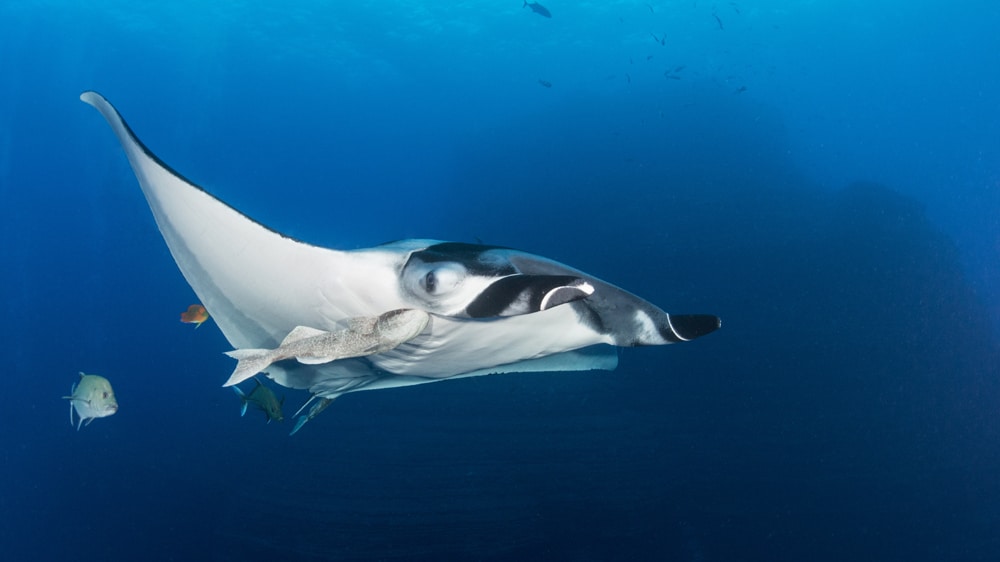Marine Life & Conservation
Komodo National Park found to be Manta Hotspot

 Through a collaborative effort between citizen divers, scientists from the Marine Megafauna Foundation (MMF), and Murdoch University, a new study reports a large number of manta rays in the waters of Komodo National Park, Indonesian, a UNESCO World Heritage Site, suggesting the area may hold the key to regional recovery of the threatened species.
Through a collaborative effort between citizen divers, scientists from the Marine Megafauna Foundation (MMF), and Murdoch University, a new study reports a large number of manta rays in the waters of Komodo National Park, Indonesian, a UNESCO World Heritage Site, suggesting the area may hold the key to regional recovery of the threatened species.
Reef mantas (Mobula alfredi), which grow up to 5m, tend to reside and feed in shallow, coastal habitats. They also visit ‘cleaning stations’ on coral reefs to have parasites, or dead skin picked off by small fish. Courtship ‘trains’ are also observed adjacent to cleaning stations. In Komodo National Park, manta rays are present year-round, challenging the famous Komodo dragon as the most sought-after megafauna for visitors.
Scientists teamed up with the dive operator community to source identification photographs of manta rays visiting the parks’ waters and submit them to MantaMatcher.org – a crowdsourced online database for mantas and other rays. Most of the photographs came from just four locations from over 20 commonly visited by tourism boats.
“I was amazed by how receptive the local dive community was in helping collect much-needed data on these threatened animals,” said lead author Dr. Elitza Germanov. “With their support, we were able to identify over 1,000 individual manta rays from over 4,000 photographs.”
“People love manta rays—they are one of the most iconic animals in our oceans. The rise of the number of people engaging in SCUBA diving, snorkeling, and the advent of affordable underwater cameras meant that photos and videos taken by the public during their holidays could be used to quickly and affordably scale data collection,” said MMF co-founder and study co-author Dr. Andrea Marshall.
The photographs’ accompanying time and location data is used to construct sighting histories of individual manta rays, which can then be analyzed with statistical movement models. These models predict the likelihood that manta rays are inhabiting or traveling in between specific sites. The study’s results showed that some manta rays moved around the park and others as far as the Nusa Penida MPA (>450 km to the west), but overall, manta rays showed individual preferences for specific sites within the Park.
“I found it very interesting how some manta rays appear to prefer spending their time in some sites more than others, even when sites are 5 km apart, which are short distances for manta rays,” said Dr. Elitza Germanov. “This means that manta rays which prefer sites where fishing activities continue to occur or that are more popular with tourism will endure greater impacts.”
Fishing activities have been prohibited in many coastal areas within Komodo NP since 1984, offering some protection to manta rays prior to the 2014 nationwide protection. However, due to illegal fishing activity and manta ray movements into heavily fished waters, manta rays continue to face a number of threats from fisheries. About 5% of Komodo’s manta rays have permanent injuries that are likely the result of encounters with fishing gear.
The popularity of tourism to these sites grew by 34% during the course of the study. An increase in human activity can negatively impact manta rays and their habitats. In 2019, the Komodo National Park Authority introduced limits on the number of boats and people that visit one of the most famous manta sites.
“This study shows that the places where tourists commonly observe manta rays are important for the animals to feed, clean, and mate. This means that the Komodo National Park should create measures to limit the disturbance at these sites,” said Mr. Ande Kefi, an employee of the Komodo National Park involved with this study. “I hope that this study will encourage tourism operators to understand the need for the regulations already imposed and increase compliance.”
Despite Indonesia’s history with intensive manta ray fisheries, Komodo National Park still retains large manta ray aggregations that with careful ongoing management and threat reduction will benefit regional manta ray populations. The study highlights that marine protected areas that are large enough to host important manta ray habitats are a beneficial tool for manta ray conservation.
For more information about MMF visit their website here.
Marine Life & Conservation
Double Bubble for Basking Sharks

 The Shark Trust is excited to announce that, for two more days only, all donations, large or small, will be doubled in the Big Give Green Match Fund!
The Shark Trust is excited to announce that, for two more days only, all donations, large or small, will be doubled in the Big Give Green Match Fund!
Donate to Basking in Nature: Sighting Giants
The Shark Trust is hoping to raise £10k which will be doubled to £20k. This will go towards Basking in Nature: Sighting Giants. And they need YOUR help to reach they’re goal.
The Shark Trust’s citizen science project is to monitor and assess basking sharks through sightings; encouraging data collection, community engagement, and promoting nature accessibility. This initiative aims to enhance health and wellbeing by fostering a deeper connection with British Sharks.
Campaign Aims
- Increase citizen science reporting of Basking Sharks and other shark sightings to help inform shark and ray conservation.
- Provide educational talks about the diverse range of sharks and rays in British waters and accessible identification guides!
- Create engaging and fun information panels on how to ID the amazing sharks and rays we have on our doorstep! These can be used on coastal paths around the Southwest. With activities and information on how you can make a difference for sharks and rays!
- Promote mental wellbeing through increasing time in nature and discovering the wonders beneath the waves!
Donate, and double your impact. Click Here
Marine Life & Conservation
Leading UK-based shark conservation charity, the Shark Trust, is delighted to announce tour operator Diverse Travel as a Corporate Patron

 Corporate Patrons provide a valuable boost to the work of The Shark Trust. The Trust team works globally to safeguard the future of sharks, and their close cousins, the skates and rays, engaging with a global network of scientists, policymakers, conservation professionals, businesses and supporters to further shark conservation.
Corporate Patrons provide a valuable boost to the work of The Shark Trust. The Trust team works globally to safeguard the future of sharks, and their close cousins, the skates and rays, engaging with a global network of scientists, policymakers, conservation professionals, businesses and supporters to further shark conservation.
Specialist tour operator Diverse Travel has operated since 2014 and is committed to offering its guests high quality, sustainable scuba diving holidays worldwide. Working together with the Shark Trust will enable both organisations to widen engagement and encourage divers and snorkellers to actively get involved in shark conservation.
“Sharks are truly at the heart of every diver and at Diverse Travel, we absolutely share that passion. There is nothing like seeing a shark in the wild – it’s a moment that stays with you forever!” says Holly Bredin, Sales & Marketing Manager, Diverse Travel.
“We’re delighted to celebrate our 10th year of business by becoming a Corporate Patron of the Shark Trust. This is an exciting partnership for Diverse and our guests. We will be donating on behalf of every person who books a holiday with us to contribute towards their vital shark conservation initiatives around the world. We will also be working together with the Trust to inspire divers, snorkellers and other travellers to take an active role – at home and abroad – in citizen science projects and other activities.”
Paul Cox, CEO of The Shark Trust, said:
“It’s an exciting partnership and we’re thrilled to be working with Diverse Travel to enable more divers and travellers to get involved with sharks and shark conservation. Sharks face considerable conservation challenges but, through collaboration and collective action, we can secure a brighter future for sharks and their ocean home. This new partnership takes us one more valuable step towards that goal.”
For more information about the Shark Trust visit their website here.
For more about Diverse Travel click here.
-

 News3 months ago
News3 months agoHone your underwater photography skills with Alphamarine Photography at Red Sea Diving Safari in March
-

 News3 months ago
News3 months agoCapturing Critters in Lembeh Underwater Photography Workshop 2024: Event Roundup
-

 Marine Life & Conservation Blogs2 months ago
Marine Life & Conservation Blogs2 months agoCreature Feature: Swell Sharks
-

 Blogs2 months ago
Blogs2 months agoMurex Resorts: Passport to Paradise!
-

 Blogs2 months ago
Blogs2 months agoDiver Discovering Whale Skeletons Beneath Ice Judged World’s Best Underwater Photograph
-

 Gear Reviews3 months ago
Gear Reviews3 months agoGear Review: Oceanic+ Dive Housing for iPhone
-

 Marine Life & Conservation2 months ago
Marine Life & Conservation2 months agoSave the Manatee Club launches brand new webcams at Silver Springs State Park, Florida
-

 Gear Reviews2 weeks ago
Gear Reviews2 weeks agoGEAR REVIEW – Revolutionising Diving Comfort: The Sharkskin T2 Chillproof Suit


















